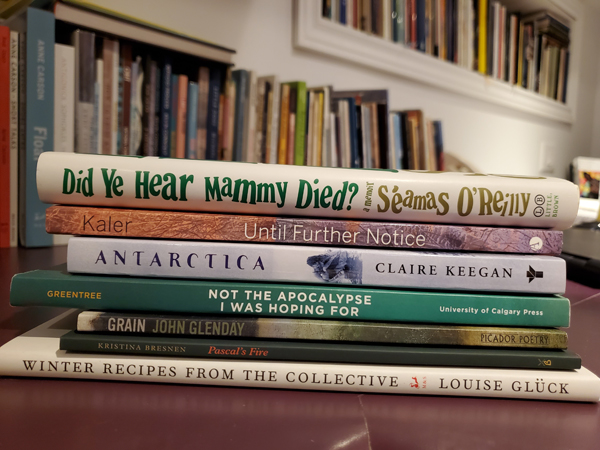At the start of the new year, our silent book club group members pondered and decided to try switching up the format of our meetings to delve into some of the themes we touch on and skim over during our regular meetings. The usual refrain from those of us moderating each meeting was, “But that’s a subject for another day …” Well, we decided to make those subjects the focus of another day and another meeting.
Themed discussions depart from but did not replace our usual meeting format, where we go round the real or virtual circle and invite everyone to update the group on recent reading delights and challenges. Since we have continued to keep up the twice-monthly tempo we established at the start of the pandemic, we decided to still have our Saturday morning, month end meetings for those regular and very lively go-rounds. Mid-month, we have what are called pop-up meetings, because they pop up with somewhat less advance notice than the Saturday meetings, typically take place in the early evening on a weekday, but vary from month to month. We’ve made the pop-up meetings our themed discussion meetings.
We’ve now had four such meetings, and I think it’s safe to say they’re a successful addition to our silent book club community. The meetings have somewhat fewer attendees – maybe 7-10, versus 12 to 15 or more for our go-round meetings. Striving to keep the meeting to around an hour, maybe a bit more, everyone in these smaller gatherings has plenty of opportunity to contribute to the conversation. In fact, I wonder if the somewhat smaller gatherings make it a little more comfortable for all to speak up. (We continue to offer a “listen only” option for all of our meetings, but I don’t recall if anyone has opted for that during our themed discussions.)
Here are the topics we’ve delved into in our themed discussion meetings so far. We always have two topics ready to go at the start of each meeting, in case one discussion runs out of steam or runs its course – although most of the discussions seem to have lots of momentum.
- Rereading – Do you revisit books, or do you always forge ahead to something new? If you do reread, what kinds of experiences have you had – more or less appreciation for a given work, etc.? Is a revisit more likely if you are rereading with your eyes or ears (relistening to an audiobook)?
- Influential authors and books – What is the book or who is the author that has been the greatest influence on you as a reader, and has stayed with you over the years? What is the book or author that has inspired some of your fondest or funniest memories?
- Unpleasant reading – What if a book turns unpleasant and out of your comfort zone? If an author is doing a commendable job of creating a graphic, disturbing or overly suspenseful situation, but it is not a comfortable reading experience, do you carry on or stop?
- Authors and lived experience – To what extent must an author have lived the experiences of their characters? As a reader, are you concerned or do you even check first to find out if an author knows firsthand about the socio-economic status, race, functional abilities, credos and so on of their characters? Or can an author achieve convincing authenticity with research, imagination and sympathy?
- Literature in translation – Do you read works in translation? (If not, why not?) What is satisfying or leaves you with questions about reading works that you are not able to read in their anguages of origin?
Highlights from these discussions are included in our previous meeting reports.
This past week, we tackled this timely subject:
- Literary awards, lists and competitions – Are they important, are they resources that guide your reading decisions, do they influence what you read? Or not? In addition to how they serve readers, how do awards, competition and bestseller lists best serve writers and publishers?
Certainly not to downplay the monetary benefits to writers and publishers of awards purses and increased book sales, our readers were less convinced that such recognitions still serve readers particularly well. Not all awards shortlists and bestseller lists seem to offer the sense of revelation and discovery that maybe they used to – are some awards performative for the founders or organizations behind them? Or is a group like ours already pretty fortunate to, well, have ourselves and our collective and diverse reading experiences to steer each other in new and interesting directions? Other readers might not have those same trusted connections and resources, so award and the like are still useful literary starting points.
One thing we did agree on is that awards and initiatives that bolster emerging talents and underrepresented demographics were worthy and offered that sense of discovery many avid readers crave. How interesting that a day or two after our discussion, this reaction to how some Canadian awards are being administered – for good or for bad – came out:
Two Canada-connected literary prizes have announced shortlists short on Canadians
by Marsha Lederman
The Globe and Mail
April 21, 2023

Are some award stickers look a bit tarnished these days?
We have more topics and questions banked and are always on the lookout for provocative articles and debates, which will likely keep our at-times-not-so-silent book club fueled for lots of future such meetings and discussions. Through them, we’ll continue to grow as readers, as neighbours and as a reading community and, I’m sure, as people who have become friends through books.

